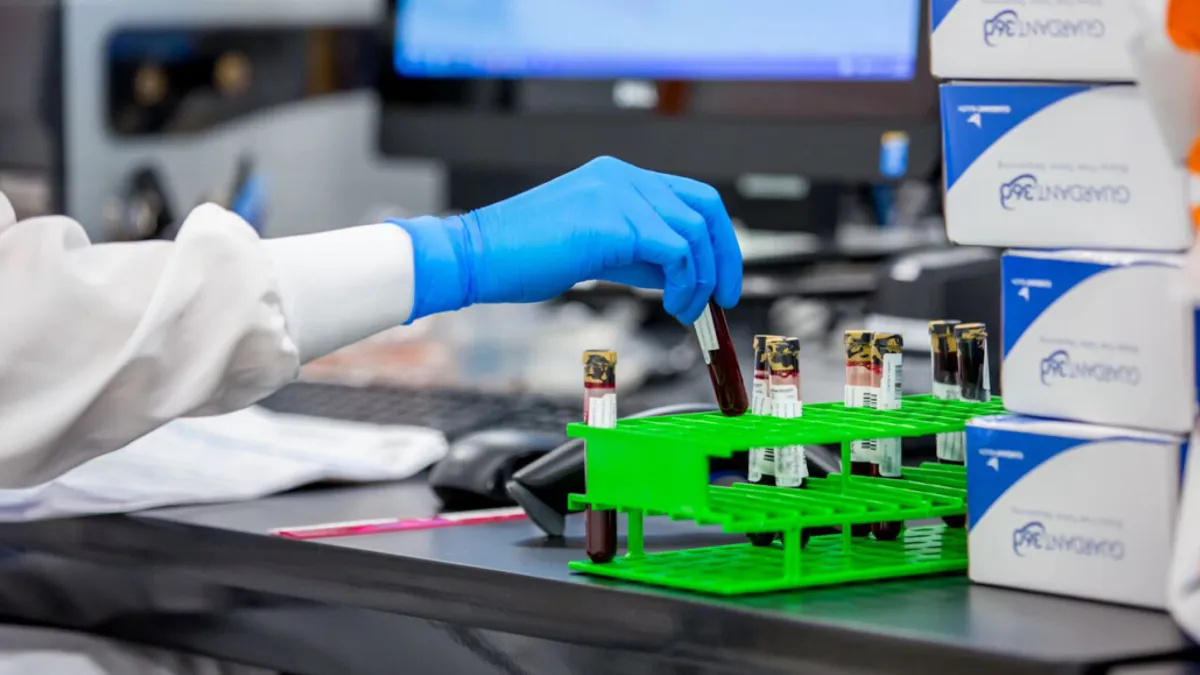Dive Brief:
- Guardant Health has stopped a trial of a minimum residual disease (MRD) test early after seeing the results of an interim analysis.
- The study, called COBRA, was evaluating the ability of Guardant’s MRD blood test to improve outcomes in patients with stage II colon cancer after surgery. Patients underwent circulating tumor deoxyribonucleic acid testing to inform further treatment.
- Guardant, which collaborated with NRG Oncology on the study, has yet to share data from the trial but confirmed it stopped early after the news leaked on social media. Shares in Guardant fell around 13% to below $35 on Friday.
Dive Insight:
Guardant and NRG Oncology, a clinical trial group funded by the National Cancer Institute, began the trial in 2020 on the strength of evidence that the LUNAR-1 blood test may help identify patients who are likely to benefit from chemotherapy after surgery. The test, the product of a multi-year project, checks for evidence of MRD to determine whether further treatment is needed to stop the cancer recurring.
The study was designed to run through to 2026 and enroll 1,400 patients but is stopping early. The decision to close it to new enrollees was based on an interim analysis. In a statement, Craig Eagle, chief medical officer at Guardant, said the company agreed with the decision. Guardant shared more details on a call with analysts.
“Management clarified that they canceled enrolling new patients in the COBRA study because of the study’s risky design and use of older generation assay, not because of assay performance. Management stated in the follow-up call that COBRA’s study design had always been a risky one given the challenging cohort population used ... and rigid protocols, but management noted the assay had performed in-line with expectations,” analysts at J.P. Morgan wrote in a note to investors.
While Guardant has yet to share the full details, the analysts called the update “an incremental negative development” for a program that previously passed major milestones such as being made available to researchers and launching commercially without incident. Those milestones, which were passed after the COBRA trial was designed, underpin Guardant’s argument that the study was inconsequential.
The blood test assessed in the study is “2-3 generations behind the current newest version,” according to the J.P. Morgan analysts, and Guardant has “since made numerous advancements to the assay used in COBRA to improve performance.”
Guardant said it remains confident in its MRD test. “The field has progressed rapidly since the study was designed over four years ago, and since the study was initiated we have made tremendous progress with multiple upgrades of our MRD test. Additionally, we have many ongoing studies that will demonstrate the effectiveness of our current MRD tests in colorectal cancer and other settings,” Eagle said in a statement.
Analysts at TD Cowen expect Guardant’s commercial MRD test, Reveal, to generate sales of around $10 million this year and $30 million in 2024. The test has Medicare coverage in colorectal cancer in the adjuvant setting. The TD Cowen analysts see expansion into the larger surveillance screening market as important for the growth of the product.










